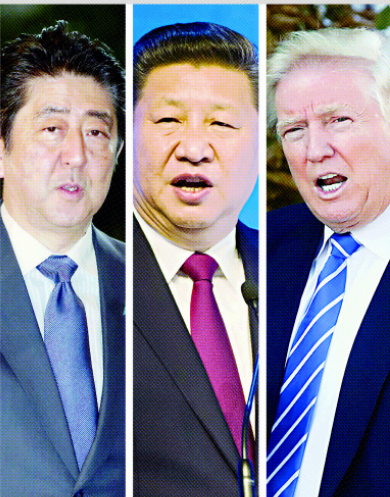hankyoreh
Links to other country sites 다른 나라 사이트 링크
[Editorial] Now is the time for South Korea to take the lead on solving diplomatic issues

During the first two days since his inauguration, South Korean President Moon Jae-in called the leaders of the US, China and Japan and discussed pressing issues related to the Korean Peninsula. Moon agreed with the leaders of the US and China to hold a summit within a short time. Considering that the North Korean nuclear issue and other diplomacy and security issues on the Korean Peninsula are the most critical issues at the moment, and given the urgency of the situation, it was necessary and appropriate for the leaders of South Korea and its neighbors to speak on the phone and publicly discuss organizing summits.
Since North Korea’s fifth nuclear test, the US decision to deploy the THAAD missile defense system in South Korea and the inauguration of President Donald Trump, it’s fair to say that the Korean Peninsula is in the gravest predicament it has been in for decades. Amid these urgent circumstances, the South Korean government has effectively been sidelined. After the impeachment of former president Park Geun-hye, the functions of government were paralyzed, and while that was happening the THAAD components were suddenly deployed, further heightening tensions. In that sense, it’s notable that Trump has invited Moon to have a candid conversation with him. If South Korea is to tackle the critical diplomacy and security issues on the Korean Peninsula, it obviously must restore a healthy and close working relationship with the US, its most important partner. While some are worried that Moon and Trump’s summit might take place too soon, it’s critical for the two leaders to quickly meet, share their opinions and find a compromise in light of the vacuum in the government that lasted for nearly half a year and everything that has happened in the meantime.
There are also quite a few noteworthy aspects of Moon’s telephone conversations with the leaders of China and Japan. Moon’s plan to send a special envoy to China to resolve the THAAD issue and the North Korean nuclear issue is particularly significant. This underscores the promise he made during his inaugural address to resolve the THAAD issue through dialogue. It’s also significant that Moon indicated (albeit in an indirect manner) during his phone call with Japanese Prime Minister Shinzo Abe that he doesn’t mean to adhere to the Dec. 2015 agreement on the comfort women issue.
During his presidential campaign, Moon announced his plan to denuclearize the Korean Peninsula, according to which South Korea would break out of the diplomacy and security crisis by taking the lead in pushing for North Korea’s denuclearization. Now more than ever is the time for Seoul to devote itself to balanced diplomacy with the position that it should take the initiative in resolving problems on the Korean Peninsula. Effectively resolving diplomacy and security problems also requires bipartisan cooperation and a process of seeking public consent.
Please direct questions or comments to [english@hani.co.kr]

Editorial・opinion
![[Column] Chaebol can’t take credit for KOSPI’s record rally [Column] Chaebol can’t take credit for KOSPI’s record rally](https://flexible.img.hani.co.kr/flexible/normal/500/300/imgdb/original/2025/1009/7717599742966572.jpg) [Column] Chaebol can’t take credit for KOSPI’s record rally
[Column] Chaebol can’t take credit for KOSPI’s record rally![[Column] Solving the dilemma of OPCON transfer and inter-Korean relations [Column] Solving the dilemma of OPCON transfer and inter-Korean relations](https://flexible.img.hani.co.kr/flexible/normal/500/300/imgdb/original/2025/1008/7017598865521297.jpg) [Column] Solving the dilemma of OPCON transfer and inter-Korean relations
[Column] Solving the dilemma of OPCON transfer and inter-Korean relations- [Column] Korea, don’t trust and don’t be fooled
- [Column] Understanding what the US means by ‘modernizing’ its alliance with Korea
- [Editorial] Judge’s conduct undermines confidence in Yoon’s insurrection trial
- [Editorial] Government negligence comes under scrutiny after Korean data center fire
- [Column] Trump at the UN: The braggadocio of evil
- [Editorial] Disruptions to government systems raises questions about Korea’s status as IT powerhouse
- [Column] There’s no compromising on ending the insurrection
- [Column] America is marching toward fascism
Most viewed articles
- 1What parallel visits to both Koreas by leaders of China, Russia may mean for NE Asia
- 2Will upcoming Korea summit allow Lee to get through to Trump on tariffs?
- 3From ‘kimbap’ to ‘maknae,’ Oxford English Dictionary sees explosion of Korean loanwords
- 4Takaichi’s rise raises concerns about stability of Seoul-Tokyo relations
- 5Special counsel seeks arrest of former justice minister on suspicion of aiding insurrection
- 6[Column] Hemedti, a true ‘hero’ of our time
- 7Women gather to protest biased investigations into hidden-camera incidents
- 8In a divided America, civic assemblies prove respectful debate is still possible
- 9[Column] Facing our fear of the “welfie” in “All of Us Are Dead”
- 10[Interview] Ensuring governments listen to proposals from the public a key piece of deliberative dem